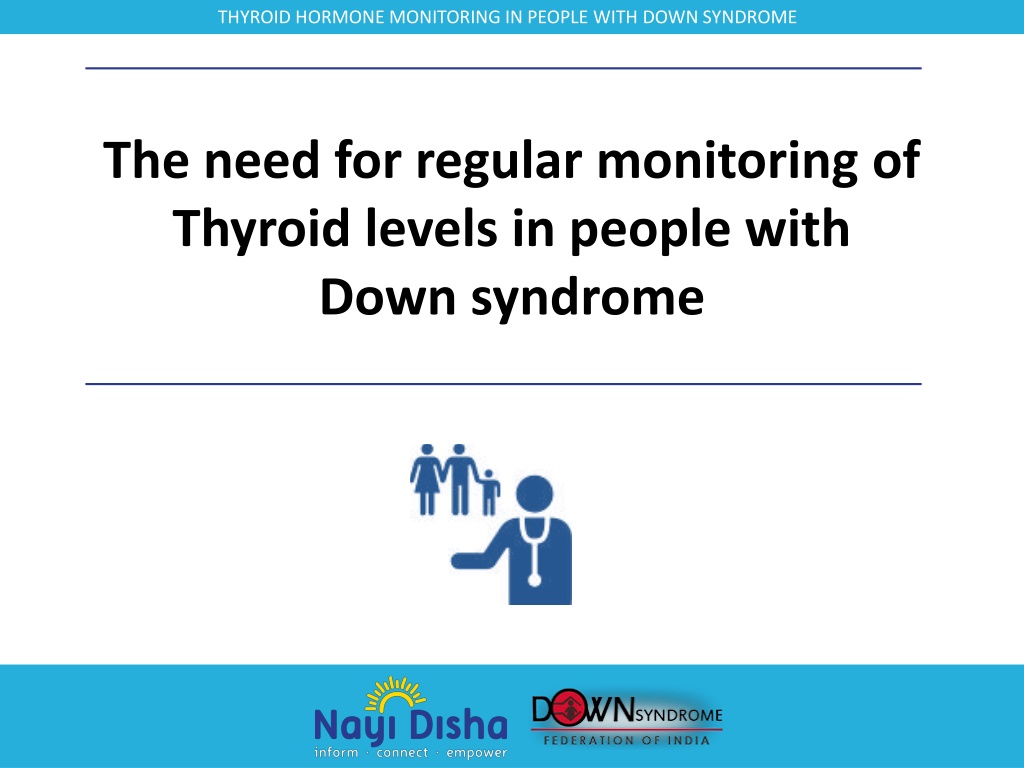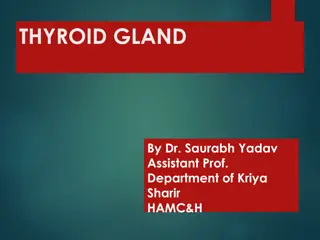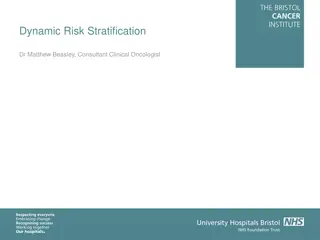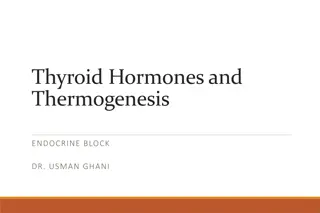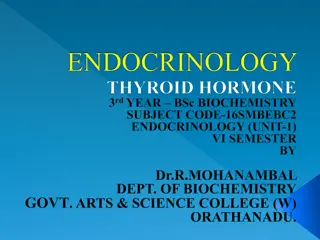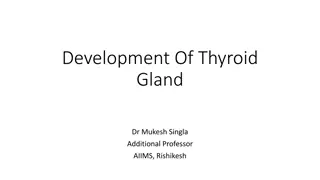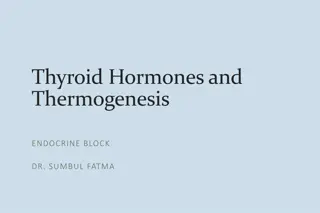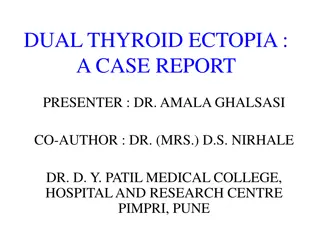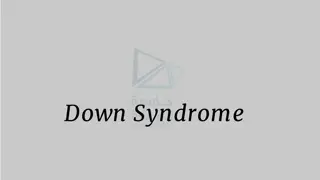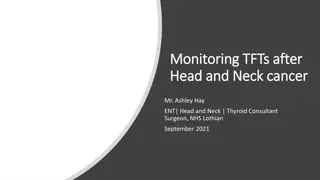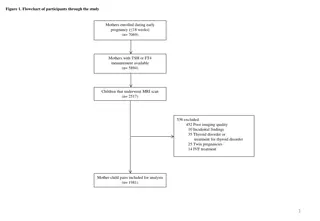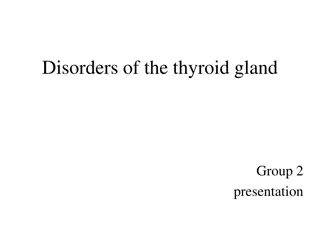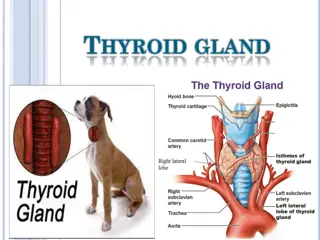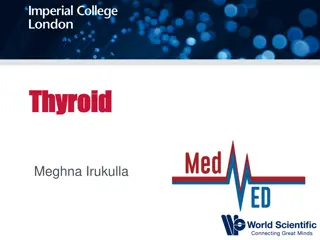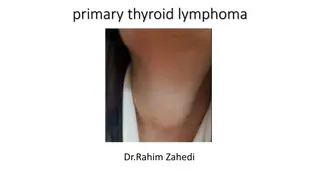Regular Thyroid Monitoring in Down Syndrome
Thyroid hormone levels should be regularly monitored in individuals with Down syndrome due to potential thyroid dysfunction. The thyroid gland plays a crucial role in regulating various bodily functions, and imbalances can lead to hypothyroidism or hyperthyroidism. Proper management of thyroid levels is essential for overall health and well-being, requiring interpretation by an endocrinologist for accurate diagnosis and treatment.
Download Presentation

Please find below an Image/Link to download the presentation.
The content on the website is provided AS IS for your information and personal use only. It may not be sold, licensed, or shared on other websites without obtaining consent from the author.If you encounter any issues during the download, it is possible that the publisher has removed the file from their server.
You are allowed to download the files provided on this website for personal or commercial use, subject to the condition that they are used lawfully. All files are the property of their respective owners.
The content on the website is provided AS IS for your information and personal use only. It may not be sold, licensed, or shared on other websites without obtaining consent from the author.
E N D
Presentation Transcript
THYROID HORMONE MONITORING IN PEOPLE WITH DOWN SYNDROME The need for regular monitoring of Thyroid levels in people with Down syndrome
THYROID HORMONE MONITORING IN PEOPLE WITH DOWN SYNDROME Where is my thyroid gland located? The thyroid gland is a butterfly- shaped gland that is situated in the front of the neck, below the Adam s apple.
THYROID HORMONE MONITORING IN PEOPLE WITH DOWN SYNDROME How is thyroid hormone generated? Brain & Pituitary gland The thyroid hormone is released in the body through a carefully regulated mechanism The signal (Thyroid stimulating hormone or TSH) for the gland to produce an inactive form of the hormone (T4) is received via the brain and pituitary gland. The thyroid gland uses iodine from food to produce the inactive hormone T4. T4 is then converted to the active thyroid hormone (T3) which enters the bloodstream and liver to regulate various tissues in the body. Brain Release of TSH Liver Heart Thyroid gland Muscle Iodine Release of inactive T4 Regulates various body organs T4 converted to T3 T3 Bloodstream T4 converted to T3 Liver
THYROID HORMONE MONITORING IN PEOPLE WITH DOWN SYNDROME What does the thyroid hormone do in the body? The thyroid hormone helps to regulate the functions of the following body parts: BRAIN & DEVELOPMENT EYES Thyroid gland HEART SKIN BODY METABOLISM INTESTINES
THYROID HORMONE MONITORING IN PEOPLE WITH DOWN SYNDROME What happens when too much or too little thyroid is produced in the body? Underactive thyroid gland Gland does not make enough thyroid hormone Detected by measuring TSH and free T4 levels High TSH Normal or low T4 T3 usually normal till very severe Hypothyroidism Overactive thyroid gland Gland makes more thyroid hormone than the body needs Detected by measuring TSH and free T4 levels Low TSH High or normal T4 High or normal T3 Hyperthyoidism To interpret thyroid values in certain situations, please see an ENDOCRINOLOGIST (hormone doctor) and do not self-assess Thyroid levels from a blood test.
THYROID HORMONE MONITORING IN PEOPLE WITH DOWN SYNDROME What does too much or not enough thyroid hormone affect your child? Too little thyroid hormone Too much thyroid hormone Changes in behavior & school performance Moody, Dry skin Hair loss Slow heart rate Weight gain emotional & prone to tears Bulging eyes Stunted growth of teeth & bones Digestive & feeding problems (e.g. constipation) Fatigue Diarrhea Fatigue Increased appetite & weight loss Trembling hands Delayed onset of puberty Muscle soreness
THYROID HORMONE MONITORING IN PEOPLE WITH DOWN SYNDROME Why is hypothyroidism a concern in children with Down syndrome? Children with Down syndrome have a higher chance of being born with Hypothyroidism There is also an increased risk of developing Hypothyroidism with age Hypothyroidism is more Hyperthyroidism in people with DS Thyroid problems in Down s syndrome are commonly caused by autoimmunity, occurring when the body starts attacking its own thyroid gland*, causing it to work less effectively, and produces less thyroid hormone. Thus, it needs to be medically supplemented to make up for the loss of hormone in the body. common than *Note: One way of attacking the thyroid gland is by generating auto-antibodies important thyroid protein called Thyroid peroxidase (TPO). Anti- TPO levels in the blood indicate an autoimmune reaction thyroid imbalances. against an causing
THYROID HORMONE MONITORING IN PEOPLE WITH DOWN SYNDROME Why is thyroid testing so important in children with Down syndrome? Normal thyroid levels are very important for normal growth and development of the body If hypothyroidism develops, growth and development will slow and halt Early diagnosis will allow for early treatment Typically treatment consists of thyroid hormone replacement in form of tablets Tablets will restore thyroid status and hence child will continue to grow normally
THYROID HORMONE MONITORING IN PEOPLE WITH DOWN SYNDROME How frequently should my child s thyroid levels be tested? At birth, and every 6 months thereafter until age of 4 After age of 4 years assess thyroid levels every 6 12 months Check for TSH, Free T4, thyroid antibodies (TPO) through a simple blood test Earlier monitoring is recommended if any symptoms of hypothyroidism are seen constipation, less activity, hair loss, skin dryness Too much Correct levels Not enough
THYROID HORMONE MONITORING IN PEOPLE WITH DOWN SYNDROME What if my doctor says thyroid levels normal but my child has symptoms that suggest a thyroid problem? This is a very common issue! Symptoms of thyroid dysfunction are not specific to low or high levels of the hormone Constipation, growth restriction, and difficulty walking are common in children with Down syndrome, even with NORMAL thyroid function This makes it difficult in some cases to diagnose a real thyroid problem. Regular screening for thyroid problems is thus very important for children with Down s syndrome
THYROID HORMONE MONITORING IN PEOPLE WITH DOWN SYNDROME What if thyroid levels are borderline, but my doctor says it s normal for their age? TSH values change with age they re highest at birth, and decrease slowly over the first 10 years of life to adult levels At birth TSH can be up to 10 mIU/L (sometimes even 20-40) Up to age of 10 years, levels of 8-10 mIU/ml of TSH are considered normal
THYROID HORMONE MONITORING IN PEOPLE WITH DOWN SYNDROME My child has Borderline TSH levels, what do I do? Your doctor will assess other parameters (T3, T4 and thyroid antibodies), and how TSH levels change over time Ideal to keep TSH between < 4 mIU/Ml in growing children Monitoring thyroid levels regularly even if your TSH levels appear normal is very important
THYROID HORMONE MONITORING IN PEOPLE WITH DOWN SYNDROME What is thyroid replacement therapy? Thyroid replacement is given in the form of Thyroid tablets, which contain T4 The tablet is safe the only problem that occurs is from improper dosage over- or under-replacement Once on stable dose of thyroid tablet, you need to check TSH and free T4 levels once every 4-6 months
THYROID HORMONE MONITORING IN PEOPLE WITH DOWN SYNDROME Can I prevent thyroid problems? To some extent yes Avoid weight gain by regular physical exercise that is appropriate for your child Maintain good nutrition, especially foods rich in Vitamin D and Iodine Iodine is essential for the thyroid gland to generate the hormone, and includes Iodized salt, seafood, eggs, potatoes, bananas, beans Vitamin D deficiency has been linked to auto-immune thyroid problems, and sources include sunlight, dairy products, seafood, orange juice And also no Hereditary or genetic factors play a strong role
THYROID HORMONE MONITORING IN PEOPLE WITH DOWN SYNDROME Who should I talk to about thyroid- related concerns? Please consult your Pediatricianfor your child s routine thyroid assessment Note - Please also download and use the Down syndrome passport to keep track of your child s thyroid levels and routine medical check-ups from birth to adulthood It is ideal to see an Endocrinologist (hormone doctor) once ever 1-2 years to monitor thyroid function
THYROID HORMONE MONITORING IN PEOPLE WITH DOWN SYNDROME What is the optimum level of Thyroid levels in a child with Down Syndrome? The optimal levels of Thyroid hormone levels to be maintained are not different in a child with Down Syndrome. They are the same as it is for typical kids. Hormone levels that need to be maintained vary according to the age of the child, not diagnosis.
THYROID HORMONE MONITORING IN PEOPLE WITH DOWN SYNDROME Thyroid supplementation has caused my child s TSH levels to drop but T3 & T4 to go up. Why and how can this happen? What do I do? The aim of treatment is to keep TSH, T4 & T3 in the normal range, not TSH alone. This is achieved by adjusting the dose of Thyroid hormone supplementation (see slide 13). Talk to your Pediatric Endocrinologist about this through regular check-ups & testing as recommended by them. Too much Correct levels Not enough Note: To learn more about what T3 and T4 signified, refer to slide 3 to understand how they are generated.
THYROID HORMONE MONITORING IN PEOPLE WITH DOWN SYNDROME Are there any side effects (e.g.nausea) of long term thyroid medication? How often should levels be checked after dose has been stabilized? There are no long term side effects with thyroid medication. Levels are monitored at least 4 to 6 months, then after 3yrs. Monitoring is done more frequently for children under 3yrs of age. Side effects can occur when high doses are given, but this is very rare as the thyroid levels are monitored regularly.
THYROID HORMONE MONITORING IN PEOPLE WITH DOWN SYNDROME How can TPO antibody levels be regulated? If TPO antibodies* are positive it suggests an autoimmune cause of hypothyroidism. Antibodies are produced by one's own immune system and cannot be regulated via medication. *Note: For more on autoimmune reaction & TPO see slide 7
THYROID HORMONE MONITORING IN PEOPLE WITH DOWN SYNDROME Once thyroid levels are balanced through medical supplementation, can thyroid replacement medication be discontinued? Thyroid replacement should be continued even after TSH levels are normal. Doses may be adjusted in some situations & there may be a medical supervised decision for stopping supplementation for few weeks to reassess the thyroid function. However, these decisions are only to be done under a doctor's supervision & not on your own.
THYROID HORMONE MONITORING IN PEOPLE WITH DOWN SYNDROME Extra Information This content has been developed in collaboration with the Down Syndrome Federation of India (DSFI) Majority of the contents of this presentation (Slides 2-15) have been adapted from Endocrinologist Dr. Jayashree Gopal s presentation at the India International Down Syndrome conference held in 2017 Dr. Jayashree Gopal is a Senior Consultant Endocrinologist & Diabetologist, consulting at Apollo Hospitals & DiabEndoIndia, Chennai. Some of the parental queries (Slides 16-20) have been addressed by Pediatric Endocrinologist Dr.Leenatha Jakkidi, who consults out of Hyderabad. DSFI is a parent support group started by Dr. Surekha Ramachandran in order to help persons with Down syndrome and their families to come to terms with Down syndrome http://www.downsyndrome.in/about-dsfi.php Nayi Disha Resource Centre is an online information resource platform that supports families of persons with Intellectual and Developmental Disabilities (IDD). http://www.nayi-disha.org
